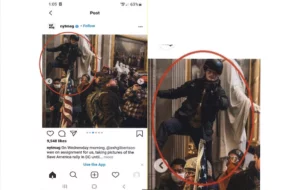“Journalism is not a crime,” President Joe Biden declared at the White House Correspondents’ Dinner just over a month ago.
Meanwhile, Biden’s DOJ is prosecuting North Carolina-based independent reporter Stephen Horn, who entered Capitol Hill on Jan. 6, 2021.
Horn, by all accounts, was engaging in purely journalistic activities on January 6. The FBI received a tip from someone that identified Horn as a journalist, and charging documents describe him as acting entirely peacefully.
Nevertheless, he faces four misdemeanors, including disorderly and disruptive conduct, and parading, demonstrating or picketing in the Capitol.
Headline USA understands there are more than 20 other reporters who, like Horn, entered the Capitol on January 6, but aren’t facing charges. Headline USA has reviewed some of their names, but is withholding them so they won’t be targeted, too.
In an interview with Headline USA, Horn recounted the events leading up to and following the infamous protest in Washington DC, which was the first Trump rally of the 24-year-old’s career.
He also provided examples of his earlier work, as well as reference letters, emails and other records supporting his claim to being a legitimate journalist—and not the pro-Trump activist that government has portrayed him as. To the contrary, he describes himself as a conservative but at no point a Trump supporter.
Horn is currently working on a J6 documentary, and his footage can be seen here.
Facing trial in September, the journalist refused a deal offered by the U.S. government to receive probation in exchange for his guilty plea.
“They wanted me to admit I was there ‘protesting, picketing or demonstrating.’ I was like, ‘Well I can’t really do that because I wasn’t protesting, I wasn’t picketing and I wasn’t parading,’” he said.
“Obviously, I can’t sign a document saying I did these things when I didn’t.”
Horn started practicing journalism when he was a home-school student helping produce a Civil War documentary. The project Horn said he’s most proud of is from 2016, when he participated in an independent investigation of financial and sexual allegations against Isaac Newton Wusu, the head of a U.S.-funded non-profit in Nigeria.
But his independent work didn’t begin until 2020, after the killing of George Floyd. Like many others, Horn took to the streets to film the “fiery but mostly peaceful protests” taking place throughout the country.
During a protest in Raleigh, Horn said he saw protestors physically threatening professional reporters—even when they had bodyguards accompanying them.
It was at that point when Horn decided to go “undercover” at potentially violent events—fashioning a covert camera out of his skateboarding helmet, and covering all future rallies without any press markings.
“If you don’t know I’m a member of the media, then people won’t be able to assault me,” he said.
Up to that point, Horn said he hadn’t attended any rallies featuring Trump as a speaker. After the controversy of the November 2020 elections, he thought the January 6 “Stop the Steal” event might be his last chance to do so.
“I am a conservative. I am on the right. But I don’t support Trump—never have, never will. But I could see he was a unique politician. The MAGA movement was different than what most other presidential candidates have inspired,” he said.
“I wanted to observe a rally in person. Being the procrastinator I am, I put it off and put it off.”
Horn booked a solo bus ticket and traveled by himself to Washington DC in the early hours of January 6.
At first, he was disappointed.
“Trump was pretty delayed. By the time he came on, I was freezing…His speech was kind of—I don’t want to say boring, but it wasn’t anything special,” he said.
Horn ducked into a Starbucks for a hot drink. It wasn’t long after that when events began to escalate.
“As I’m walking, I see a stream of people moving towards the Capitol, and sensed something was going on. I don’t know how to describe it because it wasn’t anything overt—I couldn’t even see the Capitol—but my riot sense was tingling. It’s sort of a social thing where the energy in the air just changes. It’s hard to describe,” he said.
Horn arrived at the Capitol around 1:50 p.m., and he ended up witnessing many of the most notable moments of the entire protest—starting with him seeing Derick Vargo, who had just been pushed off the northwest staircase by a Capitol police officer. The J6 journalist said he saw Vargo carried off on a piece of fencing being used as a stretcher.
The first breach of the Capitol building was around 2:12 p.m. Horn said he entered the building about 10 minutes later.
Once inside, he saw more chaos—including a heated argument between some J6ers and Capitol Police officer Harry Dunn. Several Oath Keepers purportedly protected Officer Dunn from being assaulted, but Dunn later denied receiving protection from them.
After that, Horn witnessed a group of J6ers battle with police officers in a hallway. It was here that Horn’s picture was, ironically, taken by a New York Times Magazine photographer, who hasn’t been charged.

Horn took the bus back home to North Carolina that night, and published the roughly two hours of footage he captured the next day.
At that point, Horn said he was unaware of the DOJ’s impending retaliation against all J6ers. Government officials across the country were denouncing the J6 event and seeking information about the attendees—ostensibly to publish those who committed actual acts of violence.
Under the impression that the DOJ was sincere in its pleas for information about violent offenders, Horn contacted the FBI and North Carolina’s Department of Justice on January 8, 2021, to see if his footage would be useful to them.
“Pretty much everyone agrees assault is wrong, and I thought I had footage they might be interested in,” he said. “But I had no idea they were going to go after people just for being on Capitol grounds.”
Horn heard back from the FBI on January 15, but it wasn’t for his footage.
Rather, Horn said agents said they were interested—bizarrely enough—about any information he might have about the mysterious person who planted pipe bombs near the RNC and DNC headquarters the night before January 6. FBI whistleblower Kyle Seraphin has disclosed information suggesting that the pipe bomber has connections to the government.
After a formal interview in February with his attorney present, Horn was charged about a month later.
Omitted from the charging documents was the fact that he had already reached out to law enforcement on January 8. Instead, an FBI agent said in his affidavit that he received a tip from someone about Horn on January 11.
The FBI agent did, however, admit that a tipster identified Horn as a journalist—though that obviously didn’t stop the DOJ from charging him.
More than two years later, Horn continues to battle the charges against him.
He recently made an unsuccessful motion to obtain an internal DOJ policy manual about how prosecutors deal with members of the media. Horn had wanted this document to determine whether the government was following its own guidelines in handling his case.
In opposing Horn’s motion, federal prosecutors didn’t dispute that he is a journalist—but they said that fact is irrelevant.
“The news media policy ‘is not intended to, and does not, create any right or benefit, substantive or procedural, enforceable at law or in equity by any party against the United States, its departments, agencies, or entities, its officers, employees, or agents, or any other person,’” prosecutors said, quoting from the Federal Rules of Criminal Procedure.
“Instead, the policy provides for an internal enforcement mechanism.
DC federal judge Timothy Kelly sided with the DOJ and denied Horn’s motion for the news policy manual. However, Kelly did suggest that Horn might have a viable defense if he argues that he’s being selectively prosecuted.
“I don’t rule out that there might be someone out there that you are going to—you can come forward to me and present me the case of someone truly similarly situated who wasn’t prosecuted, and then I think you are on to something,” Kelly said during a motion hearing last October.
“I think it’s your burden to come forward with someone who is similarly situated in all material ways.”
Horn said he’s in the process of obtaining affidavits from other journalists who entered the Capitol on January 6, but weren’t prosecuted. He said he’s confident at least two other reporters will give him sworn statemetents.
His trial is set for September 14.
This article was originally featured at Headline USA and is republished with permission.








